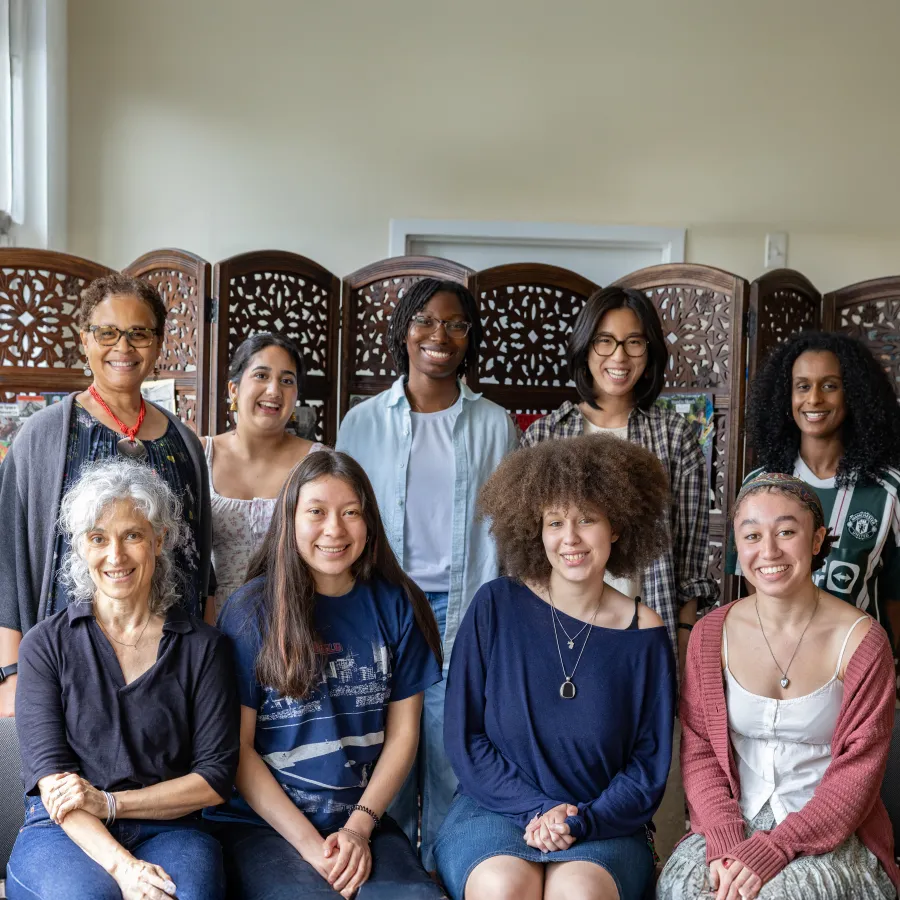Building Confidence and Community
Research & Inquiry
Smith Mellon Mays fellows take part in summer research training on campus
Smith’s Mellon Mays Undergraduate Fellows program held its first summer research training program in June. Shown here are program leaders and seven new fellows. Photo by Jessica Scranton.
Published July 8, 2025
In the Mwangi Cultural Center meeting room, where a small group of Smithies has gathered for a workshop session, the only sound is the soft clicking of laptop keyboard keys.
The rhythm matches the speed of their thoughts—faster, a bit slower, then even slower, until only a few staccato ticks suggest the group has reached a stopping point.
“Are you ready to share?” asks Rose Poku ’22, who is leading the morning training session, “From Elevator Pitch to Abstract.” One by one, the students read aloud draft summaries of research projects they’re pursuing as Mellon Mays Undergraduate Fellows.
“Awesome,” Poku says, as she listens to descriptions of topics ranging from the history of queer nightlife in Brooklyn to the psychology of American car culture. “You’ve done it; you have a research abstract!”
Research is the focus of the college’s Mellon Mays program (MMUF), which aims to increase access to scholarly careers by students historically underrepresented in academia. Established in 2000 with funding from the Andrew W. Mellon Foundation, the two-year program is open to Smith juniors and seniors interested in graduate study and teaching in the humanities and social sciences.
Ada Comstock Scholar Rahel Teka says she was drawn to the opportunity to interact with fellow researchers as her own projects take shape.
“I like the collective experience,” says Teka, an African studies and history major whose research centers on the Cold War and nationalism in Eritrea in northeast Africa. “It helps me to know I’m not doing this kind of work on my own.”
For history major Harman Jaswal ’27, pursuing academic inquiry is a longtime dream. “To feel like an expert and to have that external validation—as students of color and women of color, that’s especially important,” says Jaswal, who is studying the factors influencing migration from India.
New to Smith’s MMUF program is a pilot summer training session for this year’s seven entering fellows. Designed as a research and writing seminar, the four-week program provides structured opportunities for new fellows to interact with faculty and staff experts and other campus resources, while also providing time to immerse themselves in their own projects—and each other’s.
“We’ve prioritized two very basic things: Fellows’ deep engagement with their individual research projects, and a collective community framework that fosters social as well as intellectual camaraderie,” says Associate Professor Michelle Joffroy, who is faculty coordinator of Smith’s program and was a Ph.D. Mellon Fellow at the University of Arizona.
During the summer program, fellows live together in campus housing and share seminar and social space at Mwangi and Unity House. “We really believe in the power of building community and working together as a cohort, especially for young scholars,” Joffroy says.
In previous years, some fellows were able to attend Mellon Mays summer trainings held at other colleges, but “those spots were limited,” notes L’Tanya Richmond, Smith’s dean of multicultural affairs and director of Smith’s MMUF program. “We felt it was important for the whole group to be together.”
Richmond secured a grant from the Mellon Foundation to launch this year’s pilot summer program on campus. To fill the role of graduate instructor for workshop sessions on topics such as developing research questions and writing scholarly proposals, she reached out to Poku, who was a Mellon Mays fellow at Smith and is now studying for a doctorate in Africana studies and comparative literature at the University of Pennsylvania.
Students say the training has helped them grapple with larger questions about what it means to do research in the humanities and social sciences.
“There’s a side of academia that is rooted in oppression and exclusion about what is knowledge and what is the right knowledge,” says Uchechi Anaba ’27, an African studies major who is researching West African Yoruba food culture. “But knowledge is also something you experience. You learn from people around you.”
“My research is deeply personal,” Anaba adds. “I hope to take from this program the confidence to say what I want to say and what I care about.” Displaying their already strong scholarship skills, fellows raised numerous questions in Poku’s session on writing abstracts.
Is it advisable to quote other researchers in a journal abstract? (It’s been done.) Is it OK to cite a social media source such as Reddit in a research proposal? (Sure. There are researchers whose entire studies focus on that platform.) What about growing concerns many researchers have about the use of AI in composing abstracts? (That is a widespread concern for many reasons, including that AI may not know enough about a subject to be accurate, especially if it's a new field of inquiry.)
Students also posed supportive questions about each other’s projects, and pointed out places where effective refinements had been made.
Program leaders hope lessons from the summer research training program will inform future Mellon Mays offerings at Smith.
“I’m pretty much in awe of what these students have created for themselves as scholars and as a community within this structure,” Joffroy says. “The hope is that the Smith summer program can act as a catalyzing force on that arc, for this and future cohorts, strengthening and deepening our MMUF program.”
In addition to Anaba, Jaswal and Teka, the newest Smith Mellon Mays fellowship group includes Mia Owusu-Antwi ’27, Astrid Chen ’26, Diana Martinez ’27, and Maya Smith ’27.
